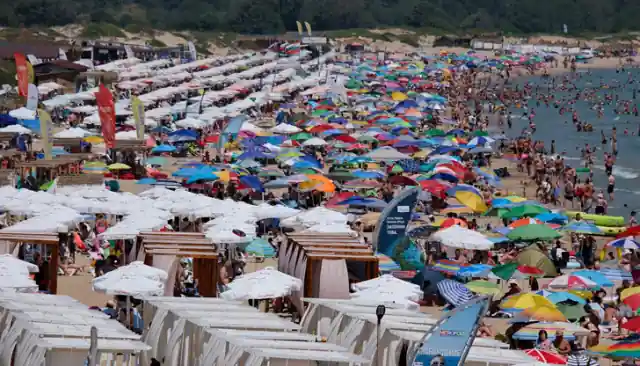
Primorsko and Kiten, two of Bulgaria’s beloved Black Sea coast destinations, are experiencing a bustling summer tourist season.
Despite facing several challenges, local businesses continue to attract a significant number of visitors, ensuring the vibrancy of these popular resorts.
Zdravko Vasilev, a resident of the area, has documented the crowded beaches through a series of photographs, highlighting the ongoing high interest in these coastal gems.
During an interview on Nova TV, Vasilev remarked on the bustling beaches, despite a noted decline in tourists from the Czech Republic, Slovakia, and Germany.
“These photos show that the season is not weak in Primorsko and Kiten,” Vasilev emphasized, adding that the current visitors are predominantly Bulgarians from “average income and below.”
Local residents and businesses in Primorsko and Kiten rely heavily on the influx of tourists to sustain their livelihoods. The beaches, serving as a prime attraction, play a pivotal role in drawing visitors.
However, Vasilev pointed out the need for stricter regulations to preserve and enhance this natural resource.
“Maritime municipalities have been deprived of any opportunity to regulate what happens on the beaches,” he stated, underscoring the urgency for local authorities to have more control over beach management.
Vasilev advocates for a reform in the current concession schemes, suggesting that they should be tailored to favor local entrepreneurs who are committed to developing summer tourism.
He believes that by granting municipalities greater involvement in managing beach concessions, sustainable development can be achieved.
“Municipalities should have a larger role in granting concessions and managing the beaches to ensure the region’s sustainable development,” he explained.
The current concession system, according to Vasilev, does not adequately support local businesses, which are already grappling with intense competition and limited backing from authorities.
This, he argues, stifles their ability to thrive and meet the demands of the tourism sector.
Vasilev’s call for a more hands-on approach by municipalities is rooted in the belief that such involvement would balance the interests of tourists and local residents, fostering a more harmonious and beneficial relationship.
Despite the reduced presence of foreign tourists, Primorsko and Kiten remain favored destinations for many Bulgarians.
The local economy, however, still requires robust support and innovative strategies to adapt to the changing dynamics of the tourism industry.
As Vasilev highlighted, the role of local businesses and the need for a supportive regulatory framework are critical to ensuring that these coastal towns continue to attract visitors and sustain their economic vitality.
In conclusion, while Primorsko and Kiten are thriving with Bulgarian tourists, the underlying challenges faced by local businesses and the call for regulatory reforms cannot be overlooked.
The engagement of local authorities in beach management and support for local entrepreneurs are essential steps towards achieving sustainable tourism development in these beloved Bulgarian resorts.
